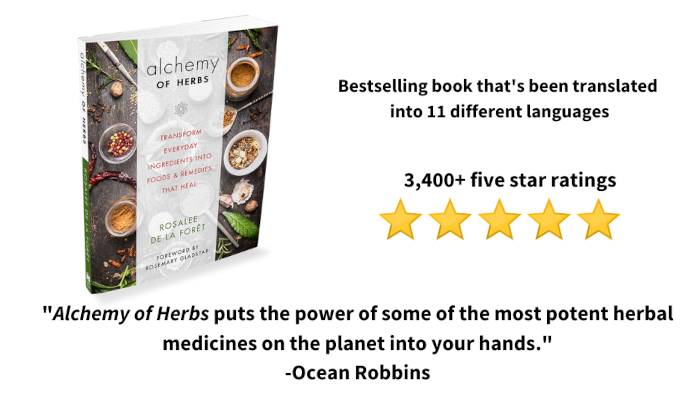Get weekly tips, recipes, and my Herbal Jumpstart e-course! Sign up for free today.
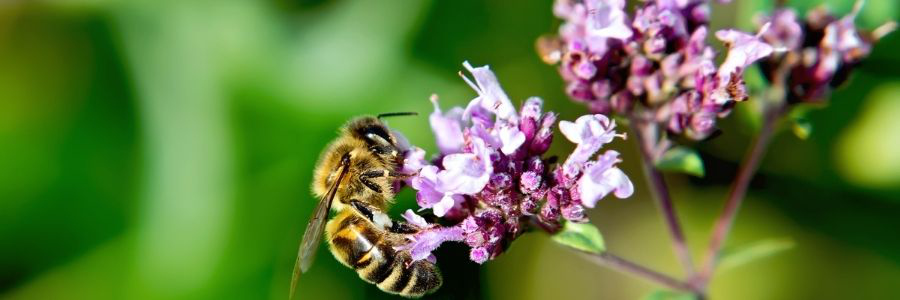
What is Oregano Good For?
Share this! |
|
What is oregano good for?
For an herb with so many gifts, oregano rarely gets the attention it deserves. In this episode, all about the health benefits of oregano tea (and including an oregano tea recipe brewed with fresh oregano leaves and another made with the dried herb), I aim to fix that.
Imagine this… Ever had a meal that sat heavy in your stomach for hours or worse, been plagued by chronically slow, sluggish digestion? What if you had a trusty friend in your spice cabinet or your garden that you could turn to for some relief? Well, oregano brewed into tea can be that friend.
The health benefits of oregano tea don’t stop there, but there are some cautions you need to be aware of when working with this herb.
You’ll come away from this episode knowing:
► How to work with oregano safely so you can avoid unwanted side effects
► How to figure out whether making oregano tea with fresh leaves or with the dried herb is right for your situation (be sure to stick around to the end for the recipes)
► Five situations when oregano might just be the herb you want to reach for, for yourself or a loved one
-- TIMESTAMPS -- What is Oregano Good For?
00:00 - Introduction to the health benefits of oregano tea
02:44 - Energetics of oregano (Origanum vulgare)
04:43 - Oregano for digestion
05:56 - Oregano as an antimicrobial
07:01 - Oregano for colds and the flu
09:15 - Oregano for delayed menses
09:40 - Oregano essential oil vs. oregano tea
11:06 - How to identify and harvest oregano
14:22 - Oregano tea recipes with fresh oregano leaves vs. dried oregano leaves
16:32 - How to make a cold-brewed oregano tea recipe with fresh oregano leaves
17:17 - How to make a hot oregano tea recipe with dried oregano leaves
19:09 - Where to get five more delicious and effective oregano tea recipes
19:43 - Oregano Fun Fact
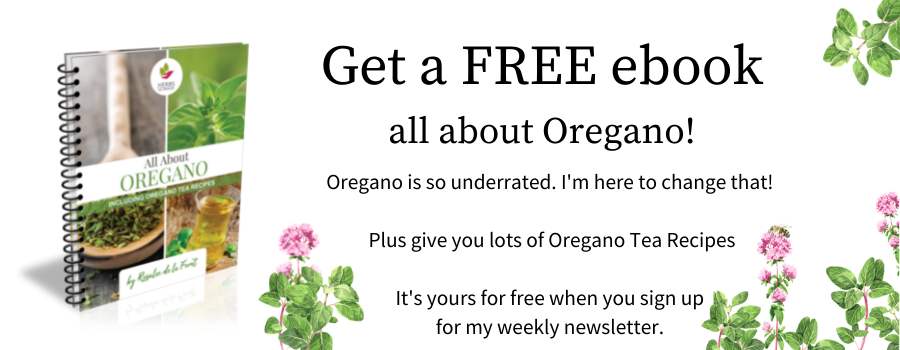
Transcript of the What is Oregano Good For Video
What is oregano good for?
The health benefits of oregano go beyond a simple culinary spice for your spaghetti! In this episode I am going to share with you the best ways to make an oregano tea recipe with fresh oregano leaves and with dried oregano leaves (and why you’d choose one over the other). I’m also going to show you the many reasons you want to pull oregano out of your spice cabinet more frequently! In other words, I’ve got all your questions about the health benefits of oregano tea covered!
Oregano is commonly found in many spice cabinets and it’s most often thought of as a simple culinary herb. However there are so many health benefits of oregano! I especially think oregano tea is underrated.
In fact, oregano itself rarely gets the attention it deserves!
In researching this episode, I looked through dozens of herbal books and it was rare to find oregano listed. It’s surprising that this potent and effective plant is so often overlooked.
Oregano is originally from the Mediterranean and it loves to grow in hot conditions with well-drained soil. Oregano is an important culinary and medicinal herb all around the Mediterranean, including in North Africa, Italy, and the Middle East. It’s widely reported that oregano did not become popular in the U.S. until after World War II, when soldiers brought it back from southern Italy.
While you’re watching, let me know in the comments below about your experience with oregano leaves. It’s always interesting and insightful to hear the experiences of plant lovers out there. Your suggestion may also help others!
What is Oregano Good For: Energetics
Oregano is a hot herb!
If you’re wondering what I mean by that, simply nibble on a fresh leaf. If you’ve got good quality oregano then you’ll most likely find that it’s spicy hot in a similar way to garlic or cayenne.
Knowing whether a plant is hot or cool or damp or dry is a foundational herbal skill referred to as herbal energetics.
Knowing a medicinal herb’s energetic profile is just as important, and perhaps even more important than memorizing its herbal actions and uses.
Even more importantly, when you know herbal energetics you’ll be much more successful at figuring out the best herbs for you, as an individual. That means you can work with herbs both more safely and effectively.
My first book, Alchemy of Herbs, shows you exactly how to choose herbs that are best for you, based on herbal energetics. So if these concepts are new to you, check out that book to get a foundational understanding.
Okay, back to What is Oregano Good For?...
This
plant is so hot that nibbling on a potent fresh leaf can leave your
tongue feeling a bit numb! The heat from oregano is diffusive in nature
and it is used to break up stagnation in the respiratory system, digestive tract, and female reproductive system.
That
sounds fancy, but it’s actually something you can easily feel for
yourself. I’m going to show you how to make oregano tea recipes in just a
bit to show you exactly what I mean.
Oregano
leaves are wonderful for people who have a tendency to feel cold and
damp. They are also great for the short term for anyone who has acute
cold and damp symptoms.
Let’s look at this more deeply for specific situations.
What is Oregano Good For: Digestion
As a culinary herb, oregano excels as an herb for digestion. Both because it’s effective but also because it tastes so good. Who doesn’t want their medicine to taste good? Its signature flavor is famous in tomato-based dishes such as pizza and marinara sauce for pasta, and it is commonly used in spice blends like za’atar, herbes de Provence, and adobo seasoning.
Oregano’s hot and dispersive nature makes it ideally suited when someone has symptoms of cold, damp, and stagnant digestion.
Symptoms of this include slow stomach emptying, a heavy feeling in the gut long after eating, flatulence, belching, a thick white coating on the tongue, feeling frequently bloated, and slow transit time in the bowels.
To support healthy digestion on a day-to-day basis, oregano can be used in small amounts as a seasoning in meals. To address the more upsetting symptoms of cold and stagnant digestion, I recommend using it as a strong tea.
What is Oregano Good For: As an Antimicrobial
Oregano is a strong antimicrobial herb that has been shown to be effective against a variety of bacteria and fungi in vitro.
One randomized, double-blind study showed that an oregano extract ointment decreased bacterial contamination and infection of post-surgical wounds.
For external use, oregano can be brewed as a tea or used as a diluted tincture as a wash to inhibit pathogens on the skin. It is often used internally for digestive pathogens. Internally, I recommend using it as a tea or tincture rather than an essential oil. When using the essential oil externally it needs to be properly diluted (dilution amount varies depending on a person’s sensitivity).
Oregano leaves tea or diluted oregano tincture can be used as a mouthwash; for best results swish for several minutes (and up to 20 minutes) at a time.
What is Oregano Good For: Colds and the Flu
Oregano leaves can be used to disperse cold and stagnant acute conditions associated with a cold or the flu (influenza). Prepared as a tea or herbal steam, it can break up congestion in the sinuses and lungs. When feeling chilled due to a fever, oregano tea or a bath made with oregano tea can support the fever process by helping the body to heat up.
The infused honey or tea can relieve the pain of a sore throat.
A 2019 study in Canada looked at 13 different hot herbal infusions and their effectiveness against the bacteria that often cause sore throats, namely strep throat.
They found that oregano was one of the best herbs that they studied for addressing the bacteria that causes strep throat. They concluded that oregano tea is a “safe treatment for the management of discomfort conditions associated with strep throat of streptococcal pharyngitis patients.”
They surmise that potential mechanisms of antibacterial and antibiofilm properties of oregano tea may have various mechanisms of action, including “the direct destruction of cell wall/membrane, inhibition of biosynthesis of cell wall/membrane, and inhibition of protein synthesis involved growth, adherence, and biofilm formation.” So basically, the health benefits of oregano tea include disrupting biofilms, which is one mechanism that bacteria use that makes them resistant to antibiotics. So cool! It’s worth mentioning that this was an in vitro study. It will be interesting to see if human clinical trials come out to further understand the health benefits of oregano tea.
I love that this study was specifically looking at oregano tea; simple preparation that you can easily make at home! In just a bit I’ll show you how to make your own oregano tea.
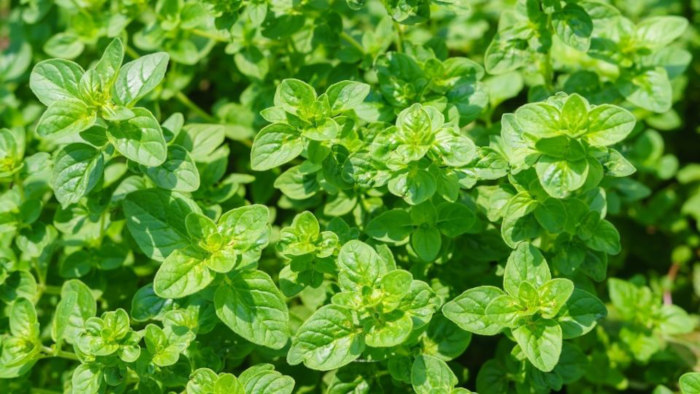
What is Oregano Good For: Delayed Menses
Oregano also moves stagnation within the pelvis and has been used for hundreds of years as a way to stimulate delayed menstruation, the herbal action called emmenagogue. It is especially indicated when there are accompanying signs of coldness. Because of this, oregano is contraindicated in large doses (beyond culinary use) during pregnancy.
What is Oregano Good For: Oregano Essential Oil vs Oregano Tea
Oregano is currently very popular as an essential oil. It is often sold as “oil of oregano,” which is the essential oil diluted in a carrier oil such as olive oil.
There’s no doubt that the oil of oregano preparation is potent. I think people are often drawn to this powerful remedy because its effects are immediate and forceful. However, there are lots of safety issues associated with this preparation. For example, exceeding safe dosages is easy. While I was in clinical practice, I worked with several people who were dealing with the long-term negative effects of taking oil of oregano internally.
Used externally, oregano essential oil can burn your skin. It’s that hot and irritating!
I most often reach for whole herb medicines because they are safer and often even more effective than highly refined essential oils. Please be cautious when choosing to use oil of oregano. You especially need to pay attention to how much you take and how often or long you take it. If you are trying to use pure oregano essential oil for internal dosing, or even externally, please work with an experienced practitioner who can show you the appropriate way to dilute the essential oil so as not to burn or damage your mucus membranes.
What is Oregano Good For: How to Identify and Harvest Oregano
There are over 50 species in the Genus Origanum. For this episode I’m focusing on Origanum vulgare.
Oregano is a member of the mint family (Lamiaceae) and contains the common mint family characteristics, including square stems and opposite leaves.
Oregano thrives in hot, dry growing conditions and in fast-draining soil. It’s a perennial herb that grows in zones 4-10.
Oregano is easy to grow in the garden or in a container. However, if you want to grow really vibrant oregano here’s a couple things to look out for. Overwatering it can dilute its flavor, so go easy with the watering can. Oregano really does prefer the heat! Oregano that is grown in cold and damp climates may not be as spicy.
Here’s a look at the botanical characteristics.
The leaves are simple and ovate with a pointed tip.
The flowers range from white to pink to purple with five petals that fuse into a tube. The flowering stalks can reach two feet high.
Bees love these flowers! When harvesting your own fresh oregano, it’s best to harvest just before the flowers bloom. However, because the bees love this plant so much, I harvest some oregano for me, and then leave some oregano to flower for the bees.
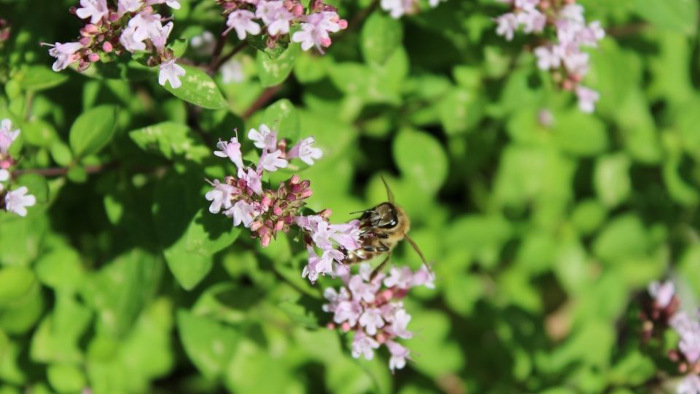
If
you’re wondering why it’s best to harvest before it flowers, then I
suggest nibbling on oregano leaves through the growing stages. You’ll
probably find that younger oregano is hot but also fragrant and bright
tasting. More mature oregano, especially during or after flowering, has a
more bitter or turpentine flavor that I personally don’t find pleasant.
But, give a taste and see what you think.
To harvest oregano, cut the tops with sharp scissors, right at the leaf axis. Leave several inches of leaves still on the plant and it will continue to grow.
Before we get to the tea recipes I want to mention how you can find the best oregano for your teas.
Growing
oregano in your garden or even in a container outside your door or on
your windowsill is a great way to get to know this plant and easily
harvest it! If you’re not up for growing your own, look for fresh
oregano at your local farmer’s market or at the fresh herb section at
your grocery store. You know oregano leaves are a good quality when they
are aromatic and the leaves taste spicy and hot.
If you’re buying dried oregano look for organic and fair trade to ensure you’re getting the best quality and the best outcome for people and the planet. If you have oregano sitting in your spice cabinet and it’s several years old then it’s probably time for an upgrade! Give it a taste to see if it’s vibrant. If not, compost that and get some freshly dried oregano. You can buy high quality dried oregano here.
What is Oregano Good For: Oregano Tea Recipes with Fresh Oregano Leaves vs Dried Oregano Leaves
There are so many wonderful ways to enjoy oregano leaves, whether it’s as a culinary spice or made into medicines like infused honey, vinegar, oxymel, tinctures and so on.
Today I want to show you one of my favorite, and I think most underrated preparations, Oregano Tea.
For this I don’t just want to show you how to make Oregano teas but also why you would choose to make it with fresh oregano leaves or with dried oregano leaves.
Oregano can be used either fresh or dried, but it is often preferred dried. Drying oregano concentrates its aromatic oils and gives it a stronger flavor. Drying herbs also makes them easier to extract into water.
However, that doesn’t mean that the fresh leaves are bad or wrong. They’re just different!
When making oregano tea with fresh leaves, I like to infuse them into cold or room temperature water. This cool water method extracts the bright aromatic flavors of oregano for a delicious and refreshing beverage. I love this on hot summer days.
You can also do a cool water tea with the dried leaves, but I think the dried leaves really shine with a hot water extraction.
Hot oregano tea made with dried leaves is a strong and powerful tea. When you drink it you’ll find that it helps to move stagnation, whether that is mucus in your respiratory tract or slow or stuck digestion. This is also the ideal preparation for when you want to support the fever process when you feel cold. It truly warms you up!
I’m going to share two recipes with you showing you both of these methods.
I recommend that you try them both and see just how different they are! I promise you that by trying these two oregano tea recipes you’ll have such a clear and solid picture of when you would want to choose one over the other.
If you’d like even more Oregano Tea Recipes then click the link above this transcript to download a special ebook gift from me to you.
What is Oregano Good For: Oregano Tea Recipe with Fresh Oregano Leaves
Ingredients
- Small handful of fresh oregano leaves, finely chopped
- Quart of room-temperature water
- Two slices of lemon (optional)
Place all the ingredients into a glass container with a lid.
Shake well.
Place in the fridge for 30 minutes or even overnight.
When ready, strain if desired and then drink within 48 hours.
There’s no preservative in this so you’ll want to drink it soon and leave it in the fridge when you’re not drinking it. Discard this tea if it smells off or develops a cloudy appearance.
What is Oregano Good For: Oregano Tea Recipe with Dried Oregano Leaves
Ingredients
- 1 tablespoon of finely crumbled dried oregano leaves
- 12 ounces of just-boiled water
- Honey (or other sweetener) to taste
Crumble the oregano leaves by rubbing them between your palms or even pulsing them in a spice grinder. This helps to increase the potency of the tea.
Steep the dried oregano leaves in the hot water, covered, for 3-5 minutes.
Covering this is really important as it will keep more of the volatile oils and flavor within the tea. Strain. Add honey or desired sweetener and drink while warm.
If you’d like to sip on this throughout the day then I recommend putting it in a small thermos to keep it warm.
There you have it! Two delicious ways to make oregano tea recipes with fresh oregano leaves and with dried oregano leaves. Making both of these teas and comparing the difference between them is a fabulous way to really understand the health benefits of Oregano Tea.
As you drink these pay attention to the difference in taste, but also spend a few moments noticing how you feel. The hot water tea especially can give you a sense of what it means for a hot herb to move stagnation in the body. You might notice your sinuses or lungs expectorate or move mucus. You might notice your digestion start rumbling… The simple act of knowing how an herbal tea works for you is an important step in helping you choose the right herb for any given situation.

What is Oregano Good For: Fun Fact
The word oregano comes from two Greek words meaning “joy” and “mountains.” In Greek mythology, oregano was created by Aphrodite and grown in her garden on Mount Olympus.
Citations for What is Oregano Good For
Click to show/hide.
Rosalee is an herbalist and author of the bestselling book Alchemy of Herbs: Transform Everyday Ingredients Into Foods & Remedies That Healand co-author of the bestselling book Wild Remedies: How to Forage Healing Foods and Craft Your Own Herbal Medicine. She's a registered herbalist with the American Herbalist Guild and has taught thousands of students through her online courses. Read about how Rosalee went from having a terminal illness to being a bestselling author in her full story here.
